Pope Francis

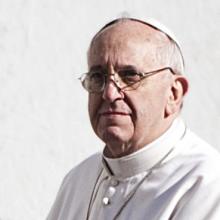
VATICAN CITY — As he dispatches a top aide to war-torn Iraq this week, Pope Francis made his most impassioned plea yet for the world to halt the “slaughter” of Christians and other religious minorities by Islamic extremists.
“The news coming from Iraq leaves us incredulous and appalled,” Francis told pilgrims in St. Peter’s Square on Sunday, as he cataloged the brutal “violence of every kind” that has driven hundreds of thousands of people from their homes and left women and children dead and dying.
“All this seriously offends God and seriously offends humanity,” the pontiff declared. “You cannot bring hatred in the name of God. You cannot make war in the name of God!”
Yet even as Francis called on the international community to find “an efficient political solution that can stop these crimes,” the Vatican also tried to make peace with the idea that U.S. military strikes that began last week were necessary and working.
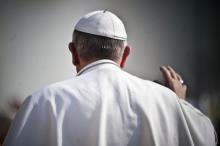
How partisan and unproductive is the current Congress?
The epitome of its dysfunction may have arrived with last week’s wrap-up before a five-week summer recess, as House Republicans failed to pass their own scaled-back bill on the border children crisis on Thursday. Realizing how bad that looked, lawmakers returned on Friday to pass an even more severe bill that had no chance of going anywhere.
But a better gauge of the problem may be the fact that despite the almost universal popularity of Pope Francis, the House of Representatives was unable to muster enough bipartisan support to pass a resolution lauding Francis’ election — nearly 18 months ago.
The bill, H.Res. 440, seems straightforward, as it aims to congratulate Francis on his March 2013 election and recognize “his inspirational statements and actions.”

American Jesuits are pushing members of Congress who were educated at the Catholic order’s schools to pass aid for thousands of refugee children who have surged across the border in Texas in recent months, calling proposals to swiftly deport them “inhumane and an insult to American values.”
“I ask you, as a leader, a parent, and a Catholic, to uphold an American tradition of which we are all proud,” the Rev. Thomas Smolich, head of the U.S. Jesuit conference, wrote to House Speaker John Boehner and 42 other House members who graduated from Jesuit high schools and colleges.
“We must welcome the refugee, the victim of trafficking, the child who has been abused or abandoned,” Smolich wrote in the July 29 letter. “Let us follow in the footsteps of Jesus when he said, ‘Let the children come to me, and do not prevent them; for the kingdom of heaven belongs to such as these.’”
Since last fall, more than 57,000 unaccompanied minors have flooded across the U.S.-Mexico border, mainly in south Texas, most of them from El Salvador, Guatemala and Honduras.
The migrants are often driven out by endemic violence in their home countries and drawn to the U.S. by prospects of better economic opportunities or the chance to reunite with their families.
But the influx has created a humanitarian crisis that has become a political wedge issue.
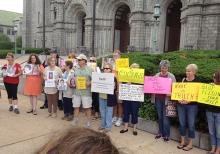
When victims of sexual abuse by Catholic priests first organized into a small band of volunteer activists in the late 1980s, reports of clergy molesting children were still new and relatively few. Most were minimized as anomalies or dismissed altogether — much the way the victims were.
But today, as the Survivors Network of those Abused by Priests, or SNAP, marks its 25th anniversary at a conference in Chicago, its members can take satisfaction in seeing that its claims have been validated, and a few (though hardly all) of its recommendations have been implemented by the church hierarchy.
And instead of facing constant verbal attacks and the occasional angry parishioner spitting on them at a protest, SNAP’s members today are far more likely to receive a handshake and a word of thanks, and maybe even a donation.
SNAP’s advocacy on the Catholic scandal also helped push the reality of sexual abuse into the public consciousness to the point that victims can regularly win in courts and get a hearing in the media, and they are much more likely to come forward to tell their stories, whether they were abused by clergy or by athletic coaches or Boy Scout leaders.
Yet that success is also presenting SNAP with a daunting new challenge as it looks to the future: how to respond to a flood of new inquiries from victims from other faiths and institutions, and how to push for changes beyond the familiar precincts of the Catholic Church.

Pope Francis met Meriam Ibrahim, the Christian woman spared a death sentence for apostasy in Sudan, at the Vatican on Thursday after she was flown to Rome by the Italian government following a vigorous international campaign to free her.
Ibrahim, 27, was accompanied by her husband Daniel Wani and two young children when she met Francis for nearly half an hour at his Santa Marta residence.
The audience was arranged only hours after she disembarked at Rome’s Ciampino Airport with her family on an official Italian aircraft. She was smiling as she carried baby Maya, who was born just two months ago as Ibrahim was shackled in prison.
The pope thanked her for her courage and loyalty to her Christian faith despite facing threats of execution in an ordeal that lasted nearly a year.
The Vatican’s chief spokesman, the Rev. Federico Lombardi, said Francis wanted Thursday’s meeting to be a “gesture of support for all those who suffer for their faith, or living in situations of difficulty or restraint.”
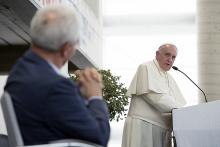
Pope Francis sought forgiveness for decades of persecution of Italian Pentecostals when he met with around 300 evangelicals from the U.S., Argentina, and Italy in the southern town of Caserta on Monday.
The pope made his second visit in as many days to the Mafia stronghold near Naples, this time to meet evangelical pastor Giovanni Traettino, whom he befriended while he was archbishop of Buenos Aires.
During the visit, Francis apologized for the persecution suffered by Pentecostals under Italy’s fascist regime in the 1920s and 1930s and urged Christians to celebrate their diversity and unity.
“Catholics were among those who persecuted and denounced the Pentecostals, almost as if they were crazy,” Francis said.
“I am the shepherd of the Catholics and I ask you to forgive my Catholic brothers and sisters who did not understand and were tempted by the devil.”
Since his election last year, the pope has been reaching out to other faiths and has held talks with Protestant, Jewish, and Muslim leaders. On Monday, he went even further by apologizing for what Catholics had done.
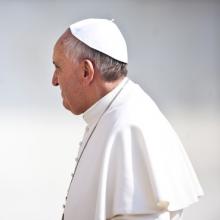
It began with the murder of an innocent 3-year-old boy who burned to death in his grandfather’s car in a Mafia ambush in January. Pope Francis was so shaken by the death of Nicola “Coco” Campolongo that he spoke out against the ferocity of the crime and those behind it.
“They are not with God,” Francis said during his visit to the nearby town of Sibari in the region of Calabria where the global crime syndicate ‘Ndrangheta is based. “They are excommunicated!”
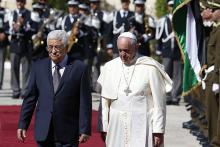
As Israel continued its ground offensive into the Gaza Strip, Pope Francis urged Israeli President Shimon Peres and Palestinian President Mahmoud Abbas to end the spiraling conflict.
The pontiff telephoned the two leaders on Friday to express “his very serious concerns” only six weeks after both me joined him at the Vatican for an historic prayer meeting.
Francis said he was concerned about the “climate of growing hostility, hatred, and suffering” that was claiming many victims, resulting in “a serious humanitarian emergency”, the Vatican said in a statement.

Rabbi Moti Rieber travels the politically red state of Kansas armed with the book of Genesis, a psalm and even the words of Jesus to lecture church audiences, or sermonize if they’ll let him, about the threat of global warming.
“My feeling is that I’m the only person these people are ever going to see who’s going to look them in the eye and say, ‘There’s such a thing as climate change,’” Rieber said. “I’m trying to let them know it’s not irreligious to believe in climate change.”
He is at the vanguard of religious efforts — halting in some places, gathering speed elsewhere — to move the ecological discussion from its hot-button political and scientific moorings to one based on theological morality and the right thing to do.
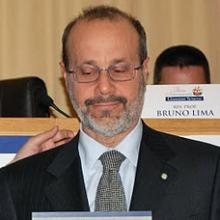
The Church of England’s vote to allow female bishops threatens unity with the Catholic Church, according to the editor of the Vatican newspaper, L’Osservatore Romano.
Giovanni Maria Vian, who is also a Rome historian, on Tuesday said the decision would have “an extremely negative impact” on steps to bring the churches closer together despite a positive meeting between Archbishop of Canterbury Justin Welby and Pope Francis a month ago.
“Clearly it’s a decision that complicates the ecumenical path,” Vian said in an interview with the Italian newspaper La Stampa published on Tuesday. “The problem is not only with Rome but also with Orthodox Churches, and that the Anglican Church is itself divided on the issue.”
After nearly 20 years of debate, the Church of England’s General Synod voted Monday to permit women priests to be ordained as bishops, overturning centuries of tradition in a church that has been deeply divided over the issue.
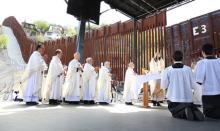
Pope Francis on Tuesday waded into the controversy of the wave of unaccompanied minors arriving at the U.S.-Mexico border, calling for an end to racism against migrants and pushing the U.S. to offer greater protection for young children entering the country illegally.
“Many of their rights are violated, they are obliged to separate from their families and, unfortunately, continue to be the subject of racist and xenophobic attitudes.”
The Argentine pontiff said a different approach is needed to tackling what he called a “humanitarian emergency” as growing numbers of unaccompanied children are migrating to the U.S. from Central America and Mexico.
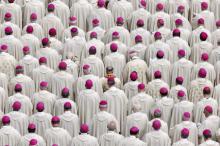
Pope Francis has provoked a debate within the Catholic Church after being quoted as saying that one in 50 Catholic clerics is a pedophile.
In the latest example of his get-tough stance against sex abuse — and his signature style of frank answers to tough questions — the pope told the Italian daily La Repubblica that the sexual abuse of children was like “leprosy” in the church and he pledged to “confront it with the severity it requires.”
But the exclusive interview with 90-year-old veteran journalist Eugenio Scalfari published Sunday drew an immediate reaction from the Vatican that disputed the accuracy of the pontiff’s quotes.
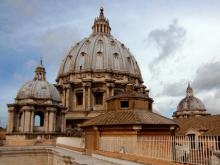
Pope Francis’ promised reforms of the Vatican bureaucracy are starting to take shape, with new leaders appointed to oversee the troubled Vatican bank and plans to overhaul the Catholic Church’s approach to global communications.
Six new lay members, including Mary Ann Glendon, a former U.S. ambassador to the Holy See and Harvard law professor, will join the bank’s board.

What does it take to produce the first-ever papal high-five? A meeting with American televangelists, apparently.
The gesture came during a three-hour meeting of Pope Francis and Texas televangelists Kenneth Copeland and James Robison, just weeks after the pontiff met with televangelist Joel Osteen and other religious leaders. At the June 24 meeting, Robison said he was so moved by Pope Francis’ message of the gospel that he asked the translator to ask Francis for a high-five. The pope obliged, raised his arm, and the two men smacked hands.

Profits plunged by more than $100 million at the Vatican bank last year after thousands of accounts were shut down in a radical overhaul of the scandal-scarred institution.
In its 2013 annual report released Tuesday, the bank, officially known as the Institute for Religious Works, said its net profit totaled 2.9 million euros ($3.9 million) last year, a dramatic drop from the 86.6 million euros ($117.8 million) it reported in 2012.
The bank said the slump was due to extraordinary expenses, losses related to externally managed investment funds and fluctuations in the price of gold.
Losses included a controversial $20.5 million loan granted to a production company owned by a friend of Cardinal Tarcisio Bertone, the former Vatican secretary of state who has faced criticism for mismanagement as the church’s No. 2 official under retired Pope Benedict XVI.
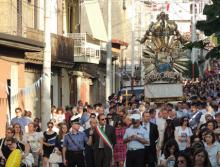
Only two weeks after Pope Francis announced he was excommunicating the Mafia, a religious procession in southern Italy has provoked uproar after paying homage to a convicted mobster.
The town of Oppido Mamertina is home to some powerful criminal clans associated with the Calabrian Mafia known as ‘Ndrangheta. For health reasons, Mazzagatti is serving his sentence at home.

Pope Francis on Monday held his first meeting with victims of clergy sex abuse, begging for forgiveness and promising to hold “accountable” the bishops who were complicit in covering up for predatory priests.
“Before God and his people I express my sorrow for the sins and grave crimes of clerical sexual abuse committed against you. And I humbly ask forgiveness,” the pope said, according to a Vatican transcript of his morning homily.
ECONOMIC INEQUALITY ISN'T NEW. But this spring it became trendy, especially after Pope Francis dropped the tweet heard ’round the world in April: “Inequality is the root of social evil.”
Around the same time, Capital in the Twenty-First Century—a just-short-of-700-page book by French economist Thomas Piketty—became a best seller. Piketty, while not quite as concise as the pope, also sees wealth inequality as a problem—he focuses on its damaging effects on democratic institutions. Using extensive data, Piketty makes the case that escalating wealth inequality is built into capitalism. Without specific interventions, he writes, our politics and culture will be dominated by a small elite controlling vast amounts of primarily inherited wealth. It might create a new Gilded Age for some, but it won’t be any shinier for regular folks than the first one a century ago.
When class and economic status become news, the conversation tends to get a little shrill. Terms such as “Marxist” and “anti-business” were tossed around freely in reference to both Piketty and the pope. Some, of a more spiritual bent, sought to warn the pope and other Christians who decry inequality about the biblical sin of “covetousness,” offering reminders of the virtue of hard work. (I guess the hidden message of the parable of the rich man and the beggar at his gate is that Lazarus is envious; the real issue must be Lazarus’ poor work ethic and lack of get-up-and-go!)
But the inequality gap should be of concern to everyone, whatever their income or ideology. The point is not the fact that there are differences in wealth—those exist in any human society. And it’s not necessarily helpful or productive to seek scapegoats or assign broad characteristics to particular classes; neither poor people in general nor rich people in general are inherently noble, lazy, or scheming—temptations may vary, but good and evil can be found in people of every economic status.

The defrocking of a former Vatican ambassador is a “sign of the seriousness” with which Pope Francis and the Vatican are approaching the clergy sexual abuse scandal, according to the Holy See’s representative to United Nations agencies in Geneva.
Archbishop Silvano Tomasi was tasked with defending the Catholic Church’s record when he presented reports to the U.N. Committee on the Rights of the Child and the U.N. Committee Against Torture in Geneva earlier this year.
During questioning, Tomasi was asked whether the Vatican would agree to extradite Archbishop Jozef Wesolowski, a Polish archbishop and papal envoy, to his native Poland after he was recalled from the Dominican Republic last September on claims of sexual abuse.

Since his March 2013 installation Mass, Pope Francis has drawn some 6 million attendees to his audiences and Angelus, his Sunday morning address in St. Peter’s Square. He has celebrated 229 daily Masses at his St. Martha residence in Vatican City and has interacted with 12,000-some individuals who have attended.